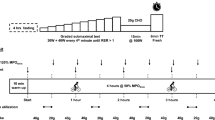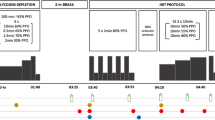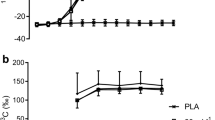Abstract
On two occasions, six well-trained, male competitive triathletes performed, in random order, two experimental trials consisting of either a timed ride to exhaustion on a cycle ergometer or a run to exhaustion on a motor-driven treadmill at 80% of their respective peak cycling and peak running oxygen (VO2max) uptakes. At the start of exercise, subjects drank 250 ml of a 15 g·100 ml−1 w/v [U-14C]glucose solution and, thereafter, 150 ml of the same solution every 15 min. Despite identical metabolic rates [VO2 3.51 (0.06) vs 3.51 (0.10) 1·min−1; values are mean (SEM) for the cycling and running trials, respectively], exercise times to exhaustion were significantly longer during cycling than running [96 (14) vs 63 (11) min; P < 0.05]. The superior cycling than running endurance was not associated with any differences in either the rate of blood glucose oxidation [3.8 (0.1) vs 3.9 (0.4) mmol· min−1], or the rate of ingested glucose oxidation [2.0 (0.1) vs 1.7 (0.2) mmol· min−1] at the last common time point (40 min) before exhaustion, despite higher blood glucose concentrations at exhaustion during running than cycling [7.0 (0.9) vs 5.8 (0.5) mmol·1−1; P < 0.05]. However, the final rate of total carbohydrate (CHO) oxidation was significantly greater during cycling than running [24.0 (0.8) vs 21.7 (1.4) mmol C6·min−1; P < 0.01]. At exhaustion, the estimated contribution to energy production from muscle glycogen had declined to similar extents in both cycling and running [68 (3) vs 65 (5)%]. These differences between the rates of total CHO oxidation and blood glucose oxidation suggest that the direct and/or indirect (via lactate) oxidation of muscle glycogen was greater in cycling than running.
Similar content being viewed by others
References
Ahlborg G, Felig P, Hagenfeldt L, Hendler R, Wahren J (1974) Substrate turnover during prolonged exercise in man; splanchnic and leg metabolism of glucose, free fatty acids and amino acids. J Clin Invest 53:1080–1090
Barclay G, Turnberg L (1987) Effect of moderate exercise on salt and water transport in the human jejunum. Gut 29:816–820
Borg G (1975) Simple rating methods for estimation of perceived exertion. In: Borg G (ed) Physical work and effort. Gleerup, Sweden pp 39–46.
Bosch AN, Dennis SC, Noakes TD (1993a) Influence of carbohydrate loading on fuel substrate turnover and oxidation during prolonged exercise. J Appl Physiol 74:1921–1927
Bosch AN, Dennis SC, Noakes TD (1993b) Under-estimation of substrate oxidation during exercise due to failure to account for bicarbonate kinetics. J Appl Physiol 75:2342–2343
Broberg S, Sahlin K (1989) Adenine nucleotide degradation in human skeletal muscle during prolonged exercise. J Appl Physiol 67:116–122
Coggan AR, Coyle EF (1988) Effects of carbohydrate feedings during high-intensity exercise. J Appl Physiol 65:1703–1709
Coggan AR, Coyle EF (1989) Metabolism and performance following carbohydrate ingestion late in exercise. Med Sci Sports Exerc 21:59–65
Coggan AR, Coyle EF (1991) Carbohydrate ingestion during prolonged exercise: effects on metabolism and performance. In: Holloszy J (ed) Exercise and sport sciences reviews. Williams and Wilkins, Baltimore, pp 1–40
Coggan AR, Habash DL, Mendenhall LA, Swanson SC, Kien CL (1993) Isotopic estimation of CO2 production during exercise before and after endurance training. J Appl Physiol 75:70–75
Consolazio CR, Johnson RE, Pecora LT (1963) Physiological measurements of metabolic functions in man. McGraw Hill, New York, pp 72–87
Costill DL, Bennett A, Branham G, Eddy D (1973) Glucose ingestion at rest and during exercise. J Appl Physiol 34:764–769
Coyle EF, Hagberg JM, Hurley BF, Martin WH, Ehsani AA, Holloszy JO (1983) Carbohydrate feeding during prolonged exercise can delay fatigue. J Appl Physiol 55:230–235
Coyle EF, Coggan AR, Hemmert MK, Ivy JL (1986) Muscle glycogen utilization during prolonged strenuous exercise when fed carbohydrate. J Appl Physiol 66:165–172
Edwards, Hopkins WG (1993) Blood glucose following training sessions in runners. Int J Sports Med 14:9–12
Felig P, Cherif A, Minagawa, Wahren J (1982) Hypoglycaemia during prolonged exercise in normal men. N Engl J Med 306:895–900
Flynn MG, Costill DL, Hawley JA, Fink WJ, Neufer PD, Fielding RA, Sleeper MD (1987) Influence of selected carbohydrate drinks on cycling performance and glucogen use. Med Sci Sports Exerc 19:37–40
Gordon B, Kohn SA, Levine SA, Matton M, de Scriver WM, Whiting WB (1925) Sugar content of the blood in runners following a marathon race. With especial reference to the prevention of hypoglycemia: further observations. JAMA 85:508–509
Hawley JA, Noakes TD (1992) Peak power output predicts maximal oxygen uptake and performance time in trained cyclists. Eur J Appl Physiol 65:79–83
Hawley JA, Dennis SC, Noakes TD (1992a) Oxidation of carbohydrate ingested during prolonged endurance exercise. Sports Med 14:27–42
Hawley JA, Dennis SC, Nowitz, Brouns F, Noakes TD (1992b) Exogenous carbohydrate oxidation from maltose and glucose ingested during prolonged exercise. Eur J Appl Physiol 64:523–527
Hawley JA, Bosch AN, Weltan SM, Dennis SC, Noakes (1994) Effects of glucose ingestion or glucose infusion on fuel substrate kinetics during prolonged exercise. Eur J Appl Physiol 68:381–389
Hermansen L, Saltin B (1969) Oxygen uptake during maximal bicycle and treadmill exercise. J Appl Physiol 26:31–37
Houmard JA, Egan PC, Johns RA, Neufer PD, Chenier TC, Israel RG (1991) Gastric emptying during 1 h of cycling and running at 75% VO2max. Med Sci Sports Exerc 23:320–325
Ivy JL, Miller W, Dover V, Goodyear LG, Sherman WM, Farrel S, Williams H (1983) Endurance improved by ingestion of a glucose polymer supplement. Med Sci Sports Exerc 15:466–471
Jones NL, Campbell EJM (1982) Calculation of results. Appendix B. In: Clinical exercise testing. Saunders, London, pp 235–239
Koyal SN, Whipp BJ, Huntsman D, Bray GA, Wasserman K (1976) Ventilatory responses to the metabolic acidosis of treadmill and cycle ergometry. J Appl Physiol 40:864–867
Madsen K, Pedersen PK, Rose P, Richter EA (1990) Carbohydrate supercompensation and muscle glycogen utilization during exhaustive running in highly trained athletes. Eur J Appl Physiol 61:467–472
Maughan RJ, Leiper JB, McGaw BA (1990) Effects of exercise intensity on absorption of ingested fluids in man. Exp Physiol 75:419–421
Neufer PD, Costill DL, Flynn MG, Kirwan JP, Mitchell KB, Houmard J (1987) Improvements in exercise performance: effects of carbohydrate feedings and diet. J Appl Physiol 62:983–988
Noakes TD (1992) Lore of running, 3rd edn. Oxford University Press, Oxford, pp 584–588
Noakes TD, Lambert EV, Lambert MI, McArthur PS, Myburgh KH, Spinndler Benade AJ (1988) Carbohydrate ingestion and muscle glycogen depletion during marathon running and ultramarathon racing. Eur J Appl Physiol 57:482–489
Pirnay F, Crielaard JM, Pallikarakis N, Lacroix M, Morosa F, Krzentowski G, Luyckx AS, Lefèbvre PJ (1982) Fate of exogenous glucose during exercise of different intensities in humans. J Appl Physiol 53:1620–1624
Rauch LGH, Bosch AN, Noakes TD, Dennis SC, Hawley JA (1995) Fuel utilisation during prolonged low-to-moderate intensity exercise when ingesting water or carbohydrate. Pflügers Arch 430:971–977
Rehrer NJ, Meijer GA (1991) Biomechanical vibration of the abdominal region during running and bicycling. J Sports Med Phys Fitness 31:231–234
Rehrer NJ, Janssen GME, Brouns F, Saris WHM (1989) Fluid intake and gastrointestinal problems in runners competing in a 25-km race and marathon. Int J Sports Med 10:S22-S25
Rehrer NJ, Brouns F, Beckers EJ, Ten Hoor F, Saris WHM (1990) Gastric emptying with repeated drinking during running and bicycling. Int J Sports Med 11:238–243
Riley ML, Israel RG, Holbert D, Tapscott EB, Dohm GL (1988) Effect of carbohydrate ingestion on exercise endurance and metabolism after a 1-day fast. Int J Sports Med 9:320–324
Sasaki H, Takaoka I, Ishiko T (1987) Effect of sucrose or caffeine ingestion on running performance and biochemical responses to endurance running. Int J Sports Med 8:203–207
Scherrer S, Haldimann B, Kuprer A, Reubi F, Bircher J (1978) Hepatic metabolism of aminopyrine in patients with chronic renal failure. Clin Sci Mol Med 54:133–140
Scrimgeour AG, Noakes TD, Adams B, Myburgh K (1986) The influence of weekly training distance on fractional utilization of maximum aerobic capacity in marathon and ultramarathon runners. Eur J Appl Physiol 55:202–209
Spencer MK, Yan Z, Katz A (1992) Effect of low glycogen on carbohydrate and energy metabolism in human muscle during exercise. Am J Physiol 262:IC975-C979
Tsintzas OK, Liu R, Williams C, Campbell A, Gaitnos G (1993a) The effect of carbohydrate ingestion on performance during a 30-km race. Int J Sport Nutr 3:127–139
Tsintzas K, Williams C, Boobis L, Wilson W (1993b) Carbohydrate ingestion and endurance running capacity. Int J Sports Med 14:295
Wahren J, Felig P, Ahlborg G, Jorfeldt L (1971) Glucose metabolism during leg exercise in man. J Clin Invest 50:2715–2725
Wilber RL, Moffat RJ (1992) Influence of carbohydrate ingestion on blood glucose and performance in runners. Int J Sport Nutr 2:317–327
Williams C, Nute MG, Broadbank L, Vinall S (1990) Influence of fluid intake on endurance running performance. Eur J Appl Physiol 60:112–119
Williams J, Mager M, Jacobson E (1964) Relationship of mesenteric blood flow to intestinal absorption of carbohydrates. J Lab Clin Med 63:853–863
Author information
Authors and Affiliations
Rights and permissions
About this article
Cite this article
Derman, K.D., Hawley, J.A., Noakes, T.D. et al. Fuel kinetics during intense running and cycling when fed carbohydrate. Europ. J. Appl. Physiol. 74, 36–43 (1996). https://doi.org/10.1007/BF00376492
Accepted:
Issue Date:
DOI: https://doi.org/10.1007/BF00376492




